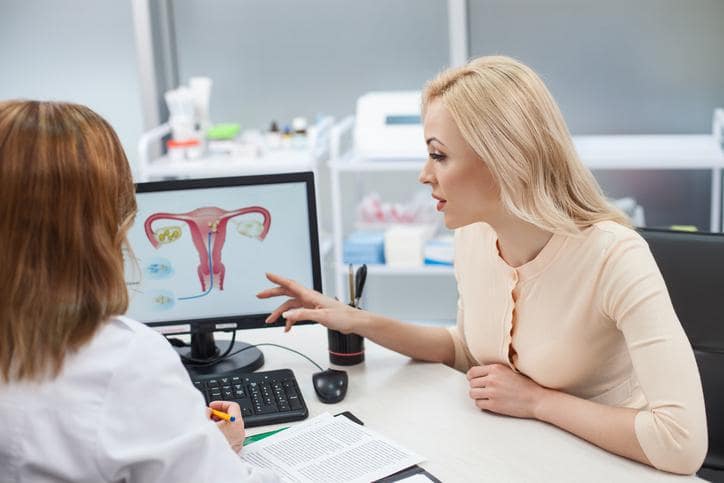
Ovarian reserve describes how many eggs are left in a woman's ovaries. A few tests can be conducted to determine a woman's ovarian reserve; here, we describe some of the most common ones.
These tests try to predict a woman's response to fertility treatment and how likely she is to get pregnant compared to other women of the same age. Abnormal ovarian reserve test results suggest that fertility potential has declined, but they do not tell who will or will not conceive. Some younger women with expected test results have difficulty conceiving. Results may vary from cycle to cycle; however, abnormal anyone test generally shows that fertility potential has decreased.
The chance of getting pregnant is primarily related to the quality of the eggs. Women over 35 with abnormal test results who have not had successful treatment have a lower chance of conceiving. These women may be candidates to use eggs or embryos from a donor. Older women may have difficulty conceiving even with a regular ovarian reserve test.
No single ovarian reserve test can predict a woman's ability to get pregnant. These tests are often used to develop a treatment plan, including the need for donor eggs or embryos.
If you are struggling with your fertility, the first step is to undergo a series of fertility tests for you and your partner to identify the root cause of the problem. For women, your ovarian reserve is one of the first things to consider when assessing your potential to conceive.
The term' ovarian reserve' refers to the number, and quality, of eggs in the ovaries and thus can often indicate a woman's reproductive potential.
There are a few tests that can be carried out to determine what a woman's ovarian reserve is, and so we have compiled a list of the most common tests used so that you can have a better understanding of how medical professionals approach identifying the root cause of your fertility struggle.
Anti-Mullerian Hormone (AMH) is a hormone produced by the developing follicles in a woman's ovaries. Measuring AMH levels indicates a woman's egg reserve (how many eggs are left in the ovaries).
High AMH levels indicate sufficient developing follicles in the ovaries, whereas low levels suggest low egg reserves. Your AMH levels can be measured via a blood test at any time during your menstrual cycle.
AMH naturally decreases with age as the ovarian reserve is depleted. AMH levels are considered 'satisfactory' if they are above 21.98 pmol/l, although age and other circumstances must be regarded to make the most accurate assessment.
Don't worry if your AMH levels are below this; at ABC ivf, we treat women with AMH levels as low as 12 pmol/l. Head to our eligibility criteria page to understand more about the test results you need to be eligible for us to support you on your fertility journey.
Follicle Stimulating Hormone (FSH) is a hormone released by the brain's pituitary gland to stimulate the growth and development of follicles within the ovaries. Developing follicles release estrogen, which inhibits the release of FSH, indicating that the ovary now has enough follicles. Therefore, when FSH levels are high, it suggests that there aren't enough developing follicles in the ovaries, and the brain sends signals to grow and develop more. Women with diminished egg reserves will have high FSH levels, and those with reasonable eggs will have low FSH levels.
FSH used to be the most common blood test to assess ovarian reserve; however, because levels can vary from month to month, we now prefer to test AMH results for a more accurate insight into your ovarian account.
Your Antral Follicle Count (AFC) is the number of developing follicles within both ovaries and is a direct indicator of your ovarian reserve. Your AFC can be monitored using a vaginal ultrasound scan because we count the number of egg-containing follicles directly instead of determining the number of eggs in your ovaries by testing your hormone levels.
Body Mass Index (BMI) measures body fat based on height and weight. Your BMI is a good indicator of your physical health, which can determine your fertility, and the success rates of fertility treatment. This is because a high BMI in women can impact ovarian function and the body's response to medication used in fertility treatment.
We are here to support you when you start your fertility journey. Book your Ultrasound Scan and Consultation with us to learn more about the treatment options available.
Are you a woman with PCOS struggling to have children? IVF is an excellent fertility treatment that can help you achieve your dream of parenthood while avoiding complications. Juhi Fertility Center, Best IVF Center in Hyderabad, will help you with your pregnancy journey.
Book a consultation today to find out more. Juhi Fertility Center is Ranked as the Best IVF Center in Hyderabad, led by one of the most Senior Fertility Specialists with over 30 years of experience.
Your email address will not be published. Required fields are marked *